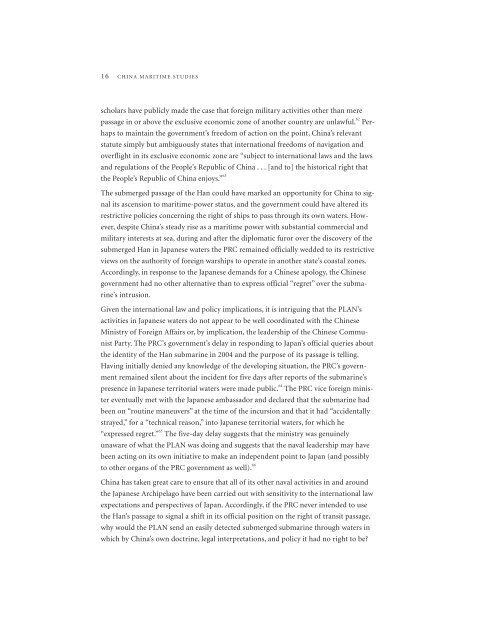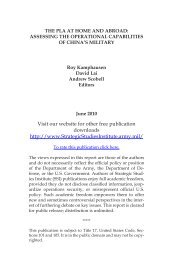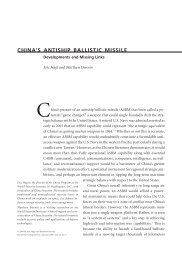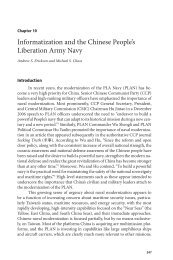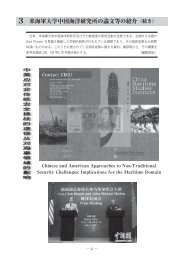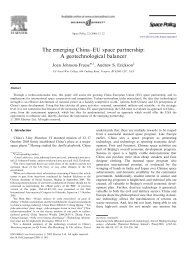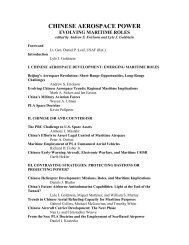Scouting, Signaling, and Gatekeeping - US Naval War College
Scouting, Signaling, and Gatekeeping - US Naval War College
Scouting, Signaling, and Gatekeeping - US Naval War College
You also want an ePaper? Increase the reach of your titles
YUMPU automatically turns print PDFs into web optimized ePapers that Google loves.
16 CHINA MARITIME STUDIES<br />
scholars have publicly made the case that foreign military activities other than mere<br />
passage in or above the exclusive economic zone of another country are unlawful. 62<br />
Perhaps<br />
to maintain the government’s freedom of action on the point, China’s relevant<br />
statute simply but ambiguously states that international freedoms of navigation <strong>and</strong><br />
overflight in its exclusive economic zone are “subject to international laws <strong>and</strong> the laws<br />
<strong>and</strong>regulationsofthePeople’sRepublicofChina...[<strong>and</strong>to]thehistoricalrightthat<br />
the People’s Republic of China enjoys.” 63<br />
ThesubmergedpassageoftheHancouldhavemarkedanopportunityforChinatosignal<br />
its ascension to maritime-power status, <strong>and</strong> the government could have altered its<br />
restrictive policies concerning the right of ships to pass through its own waters. However,<br />
despite China’s steady rise as a maritime power with substantial commercial <strong>and</strong><br />
military interests at sea, during <strong>and</strong> after the diplomatic furor over the discovery of the<br />
submerged Han in Japanese waters the PRC remained officially wedded to its restrictive<br />
views on the authority of foreign warships to operate in another state’s coastal zones.<br />
Accordingly, in response to the Japanese dem<strong>and</strong>s for a Chinese apology, the Chinese<br />
government had no other alternative than to express official “regret” over the submarine’s<br />
intrusion.<br />
Given the international law <strong>and</strong> policy implications, it is intriguing that the PLAN’s<br />
activities in Japanese waters do not appear to be well coordinated with the Chinese<br />
Ministry of Foreign Affairs or, by implication, the leadership of the Chinese Communist<br />
Party. The PRC’s government’s delay in responding to Japan’s official queries about<br />
the identity of the Han submarine in 2004 <strong>and</strong> the purpose of its passage is telling.<br />
Having initially denied any knowledge of the developing situation, the PRC’s government<br />
remained silent about the incident for five days after reports of the submarine’s<br />
presence in Japanese territorial waters were made public. 64<br />
The PRC vice foreign minister<br />
eventually met with the Japanese ambassador <strong>and</strong> declared that the submarine had<br />
been on “routine maneuvers” at the time of the incursion <strong>and</strong> that it had “accidentally<br />
strayed,” for a “technical reason,” into Japanese territorial waters, for which he<br />
“expressed regret.” 65<br />
The five-day delay suggests that the ministry was genuinely<br />
unaware of what the PLAN was doing <strong>and</strong> suggests that the naval leadership may have<br />
been acting on its own initiative to make an independent point to Japan (<strong>and</strong> possibly<br />
to other organs of the PRC government as well). 66<br />
China has taken great care to ensure that all of its other naval activities in <strong>and</strong> around<br />
the Japanese Archipelago have been carried out with sensitivity to the international law<br />
expectations <strong>and</strong> perspectives of Japan. Accordingly, if the PRC never intended to use<br />
the Han’s passage to signal a shift in its official position on the right of transit passage,<br />
why would the PLAN send an easily detected submerged submarine through waters in<br />
which by China’s own doctrine, legal interpretations, <strong>and</strong> policy it had no right to be?


